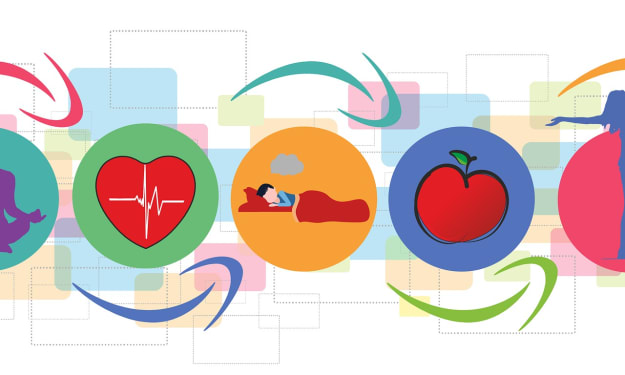Discover the Surprising Difference Between Weight Loss and Fat Loss!
Discover the true distinction between weight loss and fat loss. Learn why fat loss is a healthier approach, how weight loss can be misleading, and the importance of holistic methods for sustainable results. Get insights into tracking progress and debunking popular diets.

Losing weight and shedding fat are often used interchangeably, but they represent two distinct processes with different implications for our overall health and well-being. In this article, we will debunk common misconceptions surrounding weight loss and fat loss while emphasizing the importance of adopting a holistic approach for sustainable and long-lasting results.
Weight Loss: A Common but Misunderstood Term
When it comes to fitness and wellness, weight loss has become a widely used but often misunderstood concept. Many people associate weight loss with strict dieting, intense exercise, and deprivation. However, these traditional beliefs can lead to unrealistic expectations and potentially harmful practices.
Centuries ago, our ancestors' lives revolved around hunting, gathering, and physically demanding tasks. Their diet consisted of whole, unprocessed foods that provided nourishment and energy. In stark contrast, today's modern lifestyle is characterized by sedentary behaviors, processed foods, and convenience-driven habits. As a result, weight management has become a significant concern for many.
Fat Loss: The Healthy Path to a Slimmer You
Rather than focusing solely on weight loss, a healthier and more sustainable approach is to embrace fat loss. Fat loss entails reducing the amount of adipose tissue (body fat) while preserving or even gaining lean muscle mass. This approach enhances our physical appearance and promotes better overall health.
Three key components play a vital role in achieving successful fat loss: exercise, nutrition, and sleep. Regular physical activity helps stimulate metabolism, burn calories, and increase lean muscle mass. Incorporating both cardiovascular exercises, like running or cycling, and strength training exercises, such as weightlifting or resistance training, can be highly effective.
However, exercise alone is not enough. Nutrition plays a critical role in fat loss. A balanced and nutrient-dense diet that includes lean proteins, whole grains, fruits, vegetables, and healthy fats can provide the necessary fuel and nutrients for the body. It's important to prioritize whole, unprocessed foods over highly processed and sugary options, as the former offer more satiety and essential nutrients while minimizing empty calories.
Additionally, sleep plays a significant role in regulating our metabolism and hormone levels, including those related to hunger and satiety. Lack of sleep can disrupt these delicate balances, leading to increased appetite, cravings, and a higher likelihood of weight gain. Aim for a consistent sleep schedule and prioritize quality sleep to support your fat loss journey.
Stress Management: An Essential Aspect of Successful Fat Loss
While exercise, nutrition, and sleep form the foundation of fat loss, stress management should not be overlooked. Chronic stress triggers the release of cortisol, a hormone that can promote fat storage, particularly in the abdominal area. Implementing stress-reducing practices such as meditation, yoga, deep breathing exercises, and engaging in hobbies or activities that bring joy can help mitigate the negative impact of stress on fat loss efforts.
Adopting a holistic approach that integrates exercise, nutrition, sleep, and stress management can achieve sustainable fat loss and improve your overall well-being. It's important to remember that fat loss is not a quick fix but a gradual process that requires consistency, patience, and self-compassion.

Weight Loss vs. Fat Loss: Understanding the Relationship
Weight loss and fat loss are often used interchangeably, but it's important to recognize that weight loss is actually a subset of fat loss. When we talk about losing weight, we typically refer to a reduction in overall body weight, which can include various components such as water, muscle, and fat. However, fat loss specifically targets the reduction of adipose tissue while preserving or gaining lean muscle mass.
To gain a comprehensive understanding of body composition, it's crucial to recognize that our bodies are composed of different types of tissues, including muscle, bone, organs, and fat. While it's natural to desire a slimmer physique, the focus should be on reducing excess fat rather than solely fixating on the number on the scale.
Sustainable and long-term results should be the ultimate goal. Rapid weight loss achieved through crash diets or extreme measures often leads to losing water weight and muscle mass, rather than significant fat reduction. Such methods are not only unsustainable but can also have detrimental effects on our health.
Measuring Progress: Beyond the Scale
Stepping on a weight scale is a common method for tracking progress, but it has its limitations when it comes to assessing true changes in body composition. The scale only provides a single number that doesn't differentiate between fat, muscle, or water weight. As a result, it can be misleading and discouraging, especially when we consider that muscle weighs more than fat.
Instead, it's beneficial to explore alternative methods for measuring body fat. Techniques such as body circumference measurements, skinfold caliper tests, and bioelectrical impedance analysis (BIA) can offer more insights into changes in body composition. These methods take into account the proportion of fat and muscle, providing a more accurate reflection of your fat loss journey.
Remember, the goal is not simply to lose weight but to lose excess fat while maintaining or gaining lean muscle mass. By focusing on body fat percentage rather than the number on the scale, you can better understand your progress and make more informed adjustments to your lifestyle.
Lean Muscle Mass: The Secret to Sustainable Results
When it comes to fat loss, lean muscle mass plays a pivotal role. Unlike fat, muscle is metabolically active and requires energy to function. The more lean muscle mass you have, the higher your resting metabolic rate, meaning you burn more calories even at rest. This makes maintaining or increasing lean muscle mass essential for sustaining fat loss results.
It's crucial to differentiate between weight loss and a change in body composition. Losing weight doesn't necessarily guarantee a reduction in body fat. It's possible to lose weight through muscle loss or water weight without affecting the amount of fat in your body. However, by incorporating strength training exercises into your fitness routine, you can promote the development and maintenance of lean muscle mass while reducing body fat.
Not only does increasing lean muscle mass improve your physique, but it also provides numerous health benefits. It can enhance metabolism, increase bone density, improve insulin sensitivity, and promote overall functional strength and mobility. By focusing on building and preserving lean muscle, you set the stage for long-term success in your fat loss journey.

Debunking Fad Diets: The Truth Behind Popular Trends
In the quest for fat loss, it's common to encounter various popular diets that promise quick results. However, it's important to approach these fad diets cautiously and consider their purposes and limitations. Let's examine a couple of examples: the ketogenic (keto) diet and the paleolithic (paleo) diet.
The ketogenic diet originated as a medical intervention for individuals with epilepsy, focusing on a high-fat, low-carbohydrate, and moderate-protein intake. While it can be effective for certain medical conditions, it's important to recognize that the keto diet may not be suitable or necessary for everyone seeking fat loss. Its strict restrictions can make it challenging to adhere to in the long term and may lead to nutrient deficiencies if not properly balanced.
Similarly, the paleo diet aims to mimic the eating habits of our ancestors, focusing on whole foods and eliminating processed foods, grains, and legumes. While this approach promotes the consumption of nutrient-dense foods, it's essential to recognize that our understanding of human nutrition and evolution has evolved over time. The paleo diet may not balance macronutrients and micronutrients required for optimal health and performance.
Another popular trend is intermittent fasting, which involves alternating periods of eating and fasting. While intermittent fasting can have potential benefits such as promoting insulin sensitivity and reducing calorie intake, it may not be suitable for everyone, particularly those with specific health conditions or individuals who struggle with disordered eating patterns. It's important to consider the potential drawbacks and consult with a healthcare professional before adopting such practices.
Holistic Approach: The Key to Long-term Success
To achieve long-term success in fat loss, embracing a holistic approach that considers all aspects of health and well-being is crucial. This includes finding the right balance between exercise, nutrition, and rest. Rather than focusing on restrictive diets or intense workout regimens, it's more effective to cultivate healthy habits that can be sustained over time.
Regular exercise is essential for fat loss, but it doesn't have to involve extreme measures. Finding activities you enjoy and incorporating them into your routine will increase the likelihood of consistency. Additionally, prioritizing nutrition is crucial. Aim for a balanced diet that includes a variety of nutrient-dense foods to fuel your body and support your fat loss goals. Lastly, don't underestimate the importance of rest and recovery. Allow your body to repair and recharge by getting sufficient sleep and managing stress.
The Role of Professional Guidance: Seeking Expert Advice
In the journey towards fat loss, seeking professional guidance can provide valuable support and guidance. Consulting with nutritionists, trainers, and health experts can help you create a personalized fat-loss plan tailored to your individual needs and goals. These professionals can provide evidence-based recommendations, offer accountability, and help you navigate through the abundance of information available.
Remember that every individual is unique, and what works for one person may not work for another. Seeking professional guidance ensures that you receive personalized advice that takes into account your specific circumstances and helps you make informed decisions.
In summary, weight loss and fat loss represent two distinct concepts with different implications. Fat loss, which focuses on reducing excess adipose tissue while preserving or gaining lean muscle mass, offers a more sustainable and health-centric approach compared to solely focusing on weight loss.
By debunking fad diets and understanding their limitations, you can make informed choices about the most suitable approach for your fat loss journey. Embracing a holistic approach that emphasizes a balance between exercise, nutrition, and rest is key to achieving long-term success. Additionally, seeking professional guidance can provide valuable support and ensure your fat loss plan is customized to your needs and goals.
Remember, fat loss is a gradual process that requires patience, consistency, and a commitment to cultivating healthy habits. By embracing a balanced lifestyle and focusing on sustainable practices, you can achieve your fat loss goals and enjoy the benefits of improved overall well-being.
References:
1. Harvard Health Publishing. (2018, December). Losing Weight: Getting Started. Harvard Medical School. Retrieved from https://www.health.harvard.edu/staying-healthy/losing-weight-getting-started
2. Mayo Clinic Staff. (2021, February 25). Weight Loss: Gain Control of Emotional Eating. Mayo Clinic. Retrieved from https://www.mayoclinic.org/healthy-lifestyle/weight-loss/in-depth/weight-loss/art-20047342
3. National Sleep Foundation. (n.d.). How Sleep Affects Weight Loss. National Sleep Foundation. Retrieved from https://www.sleepfoundation.org/physical-health/how-sleep-affects-weight-loss
4. American Council on Exercise. (n.d.). How to Measure Body Composition. Retrieved from https://www.acefitness.org/education-and-resources/lifestyle/blog/6442/how-to-measure-body-composition/
5. Laskowski, E. R. (2019). How fit are you? See how you measure up. Mayo Clinic. Retrieved from https://www.mayoclinic.org/healthy-lifestyle/fitness/in-depth/fitness/art-20046433
6. Manore, M. M., & Thompson, J. L. (2000). Sports Nutrition for Health and Performance. Human Kinetics.
7. Paoli, A., Rubini, A., Volek, J. S., & Grimaldi, K. A. (2013). Beyond weight loss: a review of the therapeutic uses of very-low-carbohydrate (ketogenic) diets. European Journal of Clinical Nutrition, 67(8), 789–796.
8. Manheimer, E. W., van Zuuren, E. J., Fedorowicz, Z., & Pijl, H. (2015). Paleolithic nutrition for metabolic syndrome: systematic review and meta-analysis. The American Journal of Clinical Nutrition, 102(4), 922–932.
9. Patterson, R. E., Laughlin, G. A., LaCroix, A. Z., Hartman, S. J., Natarajan, L., Senger, C. M., … & Gallo, L. C. (2015). Intermittent fasting and human metabolic health. Journal of the Academy of Nutrition and Dietetics, 115(8), 1203–1212.
Join our Telegram Group "ActiveLife Society" -
About the Creator
Tushar Bhangale
Triathlon Coach, Movement Specialist, and Preventive Health Expert.
Founder of www.sculptingyoustrong.com.
Free Telegram Community https://t.me/+Kn6v5bPvyhgxMTE9
Follow more here






Comments
There are no comments for this story
Be the first to respond and start the conversation.